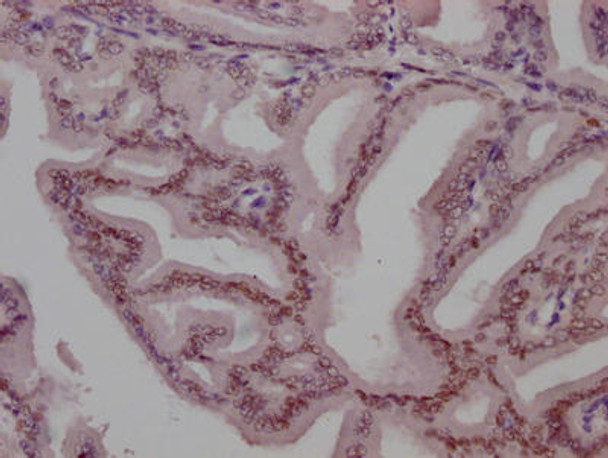Anti-AR Antibody (RACO0443)
- SKU:
- RACO0443
- Product type:
- Recombinant Antibody
- Reactivity:
- Human
- Host Species:
- Human
- Isotype:
- IgG
- Application:
- ELISA
- Application:
- IHC
- Conjugation:
- Unconjugated
Description
| 商品名: | AR Antibody |
| Product SKU: | RACO0443 |
| サイズ: | 50ul |
| 宿主種: | Homo sapiens (Human) |
| 申し込み: | ELISA, IHC |
| 推奨される希釈: | IHC:1:50-1:200 |
| 反応性: | Human |
| 免疫原: | A synthesized peptide derived from human Androgen Receptor |
| 憲法: | Liquid |
| ストレージバッファ: | Rabbit IgG in phosphate buffered saline, pH 7.4, 150mM NaCl, 0.02% sodium azide and 50% glycerol. |
| 精製方法: | Affinity-chromatography |
| 抗体のクローン性: | Monoclonal |
| アイソタイプ: | Rabbit IgG |
| Conjugate: | Non-conjugated |
| バックグラウンド: | Steroid hormone receptors are ligand-activated transcription factors that regulate eukaryotic gene expression and affect cellular proliferation and differentiation in target tissues. Transcription factor activity is modulated by bound coactivator and corepressor proteins. Transcription activation is down-regulated by NR0B2. Activated, but not phosphorylated, by HIPK3 and ZIPK/DAPK3. |
| シノニム: | Androgen receptor (Dihydrotestosterone receptor) (Nuclear receptor subfamily 3 group C member 4), AR, DHTR NR3C4 |
 | IHC image of RACO0443 diluted at 1:100 and staining in paraffin-embedded human prostate tissue performed on a Leica BondTM system. After dewaxing and hydration, antigen retrieval was mediated by high pressure in a citrate buffer (pH 6.0). Section was blocked with 10% normal goat serum 30min at RT. Then primary antibody (1% BSA) was incubated at 4°C overnight. The primary is detected by a Goat anti-rabbit IgG polymer labeled by HRP and visualized using 0.05% DAB. |
| UniProt Protein Function: | AR: a nuclear hormone receptor and transcription factor. Regulates gene expression and affects cellular proliferation and differentiation in target tissues. Two splice-variant isoforms have been described. |
| UniProt Protein Details: | Protein type:Transcription factor; Nuclear receptor; DNA-binding Chromosomal Location of Human Ortholog: Xq12 Cellular Component: nucleoplasm; protein complex; cytoplasm; nuclear chromatin; nucleus Molecular Function:protein dimerization activity; protein binding; ligand-dependent nuclear receptor activity; androgen receptor activity; enzyme binding; DNA binding; androgen binding; zinc ion binding; beta-catenin binding; chromatin binding; transcription factor binding; transcription factor activity; receptor binding Biological Process: prostate gland development; transcription initiation from RNA polymerase II promoter; intracellular receptor-mediated signaling pathway; transcription, DNA-dependent; positive regulation of transcription, DNA-dependent; signal transduction; protein oligomerization; activation of NF-kappaB transcription factor; negative regulation of integrin biosynthetic process; cell proliferation; cell-cell signaling; transport; androgen receptor signaling pathway; positive regulation of cell proliferation; positive regulation of transcription from RNA polymerase III promoter; gene expression; steroid hormone mediated signaling; positive regulation of transcription from RNA polymerase II promoter; positive regulation of integrin biosynthetic process; cell growth; sex differentiation; positive regulation of phosphorylation Disease: Androgen Insensitivity Syndrome; Prostate Cancer; Androgen Insensitivity, Partial; Hypospadias 1, X-linked; Spinal And Bulbar Muscular Atrophy, X-linked 1 |
| NCBI Summary: | The androgen receptor gene is more than 90 kb long and codes for a protein that has 3 major functional domains: the N-terminal domain, DNA-binding domain, and androgen-binding domain. The protein functions as a steroid-hormone activated transcription factor. Upon binding the hormone ligand, the receptor dissociates from accessory proteins, translocates into the nucleus, dimerizes, and then stimulates transcription of androgen responsive genes. This gene contains 2 polymorphic trinucleotide repeat segments that encode polyglutamine and polyglycine tracts in the N-terminal transactivation domain of its protein. Expansion of the polyglutamine tract causes spinal bulbar muscular atrophy (Kennedy disease). Mutations in this gene are also associated with complete androgen insensitivity (CAIS). Two alternatively spliced variants encoding distinct isoforms have been described. [provided by RefSeq, Jul 2008] |
| UniProt Code: | P10275 |
| NCBI GenInfo Identifier: | 113830 |
| NCBI Gene ID: | 367 |
| NCBI Accession: | P10275.2 |
| UniProt Secondary Accession: | P10275,Q9UD95, A2RUN2, B1AKD7, |
| UniProt Related Accession: | P10275 |
| Molecular Weight: | 44,643 Da |
| NCBI Full Name: | Androgen receptor |
| NCBI Synonym Full Names: | androgen receptor |
| NCBI Official Symbol: | AR |
| NCBI Official Synonym Symbols: | KD; AIS; TFM; DHTR; SBMA; HYSP1; NR3C4; SMAX1; HUMARA |
| NCBI Protein Information: | androgen receptor; androgen nuclear receptor variant 2; dihydrotestosterone receptor; nuclear receptor subfamily 3 group C member 4 |
| UniProt Protein Name: | Androgen receptor |
| UniProt Synonym Protein Names: | Dihydrotestosterone receptor; Nuclear receptor subfamily 3 group C member 4 |
| Protein Family: | Allatostatin |
| UniProt Gene Name: | AR |
| UniProt Entry Name: | ANDR_HUMAN |

